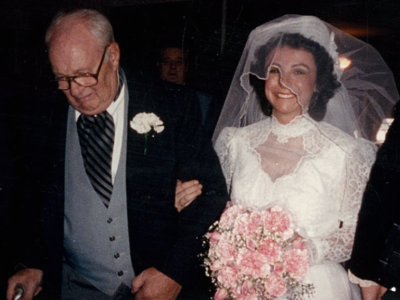This post describes, in part, the effects of a degenerative neurological condition called Huntington’s Disease. Any negative behavior on the part of my wife should be attributed to that condition. Any negative behavior on the part of myself should be attributed to my need for God’s ongoing grace.
If you would like to read our story from the beginning, you can start here: How We Got Here…
This week Janet stopped eating. As I write this, Frannie and I have been able to get her to eat some soup from an Italian restaurant, but there were days when she didn’t eat at all. Her weight is below 100 lbs. How long can someone with such a low body weigh last with no – or at very little – food?

Janet has started taking naps in the middle of the day; in fact, she’s sleeping almost non-stop now. Friday morning we had a meeting with a hospice nurse, and she has been accepted back into home hospice, so we will be receiving visits from a home health aide three times a week. Later that day we took delivery on her hospital bed (which she loves) and some other miscellaneous equipment.
The only remaining question is how long will she be needing them?
❦ ❦ ❦ ❦ ❦ ❦
When I first started coming to the support forums, the first thing I noticed was that the demographic of the participants was overwhelmingly female. To me this fact was curious because I knew that HD affects men and women in equal numbers. Therefore, it seemed logical that there should be about equal numbers of male and female participants on the forums.
At Janet’s next HD appointment, I talked to the clinic’s social worker and related my observation. Her reaction was, “Oh yes, they have done studies and it’s a real thing. Male caregivers rarely reach out for support, and male patients with no woman (wife, daughter, etc) caring for them also don’t get the support they need.”
Ok, but is that observation accurate? Well, as they used to say back in the 60’s, “It’s a mixed bag.” On a gross level, my feeling about numbers was pretty close. An organization called the National Family Caregivers Association did a study a few years ago across all chronic conditions and determined that in the US there are about 54 million people who are serving as primary caregivers for a family member. Of that number 44% – or just shy of 24 million – are men.
But therein lies a problem. If the social worker is right that men just aren’t getting the support they need, guys should be dropping like flies, but statistically speaking, we just don’t see that happening. So it would seem that we men are getting the support we need, but it looks different. That realization, in turn, got me wondering: what other things do men do differently in a caregiving situation?
But before we go any further, I need to issue a couple warnings:
- Generalizations: There are a lot of them coming up. The point is not to try to force people into boxes with roles to fulfil. Rather, learning about generalized behavior can be a path to self discovery because, even if the fit isn’t perfect, it can nevertheless give you insight into how you behave and react.
- Exceptions: Yes, there are always exceptions. This point sort of goes with the previous one about generalizations. People are not stereotypes, so if you don’t fit the mold: Good for you! Celebrate the parts of you that don’t fit the pattern. Often I find that those “ill-fitting” bits are actually gifts that make me better suited for what I need to do.
So starting with the question of where do guys get support, we need to recognize that “support” can look very different for men.
To begin with, it is a well-recognized fact that men are not “joiners” – meaning that associations outside their inner circle of family and friends tend to be transient. In discussing this tendency, psychologists often like to think in “evolutionary terms” and so will wax philosophical about wandering bands of nomadic hunters meeting by chance on the vast Serengeti plain and agreeing to temporarily work together to bring down a mammoth, giant sloth or something.
For me, though, it matters little whether this trait was “evolved” into men, or as I feel is far more likely, consciously put there by our Creator. The point is that the support structures for men clearly tend to be less formal and more ad-hoc. Consequently, it is reasonable to have fewer men willing to “sign up” for a support group, and for fewer still to actively participate.
But, if support doesn’t occur in formal groups, where does it happen? Sometimes in a tree stand when there doesn’t appear to be a deer in 100 miles of you. Sometimes support occurs in a boat in the middle of a lake, when nothing is biting. And sometimes it happens during a lull in an oil change, or over a beer while you’re enjoying the pleasant coolness of dusk and watching the sun go down.
While, there will be those that will complain that the last paragraph was written from a rural North American (i.e. red-neck) perspective, the point is that support happens in unpredictable and unplanned ways. Support can also occur at work, in a pub or cafe, or riding on a commuter train.
Next, it should be noted that, paradoxically, many men will only argue with close friends. Why? First, it’s because the only opinions that most guys really care about are those of their friends. Why get into an argument with someone who’s opinions you don’t respect?
Please note that in making this statement I am drawing a distinction between having an argument (or making an argument), and just yelling at someone. It’s the difference between having a “meaningful dialogue” and “sending a message” – a thoroughly offensive cliché, by the way. For completeness sake, I should point out that there is also something called expository speech where someone is trying to convince someone of something. In this framework, expository speech falls somewhere between arguing and yelling at people – exactly where it falls, depends upon the topic and the speaker!
Secondly, men argue with friends because it is safe to do so. With a friend you can disagree and shout and yell, but you never have to worry about losing that which is really important: your friendship. This point is so important because the best conversations occur when personalities, identities and ego aren’t involved.
Therefore, among men, expressions of friendship can be more (How shall I say this?) “abrasive.” For example, once while I was in the Air Force we once flew into an Italian Air Force Base outside of Pisa. Two local civilians came out to service our plane and got into a disagreement with each other about something. Soon they were toe-to-toe screaming at each other and gesticulating wildly. Concerned, I asked another one of the other ground crew whether we should do something.
“No,” he said, “they’re brothers-in-law. They always yell at each other. They’ll be fine.”
And they were, I saw them a hour or so later laughing and joking over beers.
In a similar vein, it should be remembered that it was men who invented “snipe hunting” and many similar “bonding” exercises…
There are also differences in the way men approach challenges, in that we are problem solvers. We like to approach challenges logically and dispassionately because it is built into our DNA to react in that way. For us our #1 goal is to, “work the problem.” Hence, we try to shut out everything that isn’t part of the solution – including emotion.
So you see, it’s not that we don’t care, but rather it is precisely because we care very deeply that we appear to shut down emotionally. Perhaps this is the reason that men are so good at handling crises. Of course the other side of that coin is that we try to bring that same level of intensity to the management of chronic situations, so we tend to burn out (a lot) faster.
So where do I fit into this puzzle? Well remember what I said above about “generalizations” and “exceptions?” When I was a kid we would go to visit my Mom’s family in Iowa (a little town named Morse, near Iowa City). At these family gatherings, the men folk would, depending upon the season, congregate in either the living room or on the front porch. They would talk about cars, tractors and the price of hogs and corn – all important things to know about if you live in Iowa.
But the women – my Mom, grandmother, and always a couple aunts or great aunts – would gather in the kitchen and talk about things that sparked my imagination. They would have wonderfully loud, joyous conversations. In some ways, fixing dinner was like a religious ceremony because everything meant something.
For example, there were the holy relics:
“That’s your great-great-grandmother’s roasting pan.”
And rubrics:
“Always stir cake batter to the right and never reverse directions – it will spoil the cake.”
History lessons:
“Did you know, when I first started teaching, teachers weren’t allowed to be married?”
And applications for daily living:
“Don’t use all the buttermilk! Pappy will want some to sop his cornbread in after dinner.”
The bottom line is that dinner wasn’t just about food, it was about telling and retelling for the millionth time the story of who were. So I guess while I unabashedly exhibit many of the male traits mentioned above, thanks to the strong women that were around me as I grew, I have also come to wear my heart on my sleeve, at times rather more than what is comfortable.
Because I understand how remembered stories and traditions can hold us together when times are hard, I may someday share some of those stories. I may write about my grandmother who was a teacher in a one-room schoolhouse, and often said that the main thing you learned in a one-room school was how to be a good citizen. Or I might talk about her sister, my Aunty Butch (pronounced to rhyme with “hutch” or “crutch”) who gave up the chance of having children of her own to protect her best friend’s children from an abusive father.
We’ll see…
Finally, we need to understand that culturally, men are horribly ill-prepared for the role that they find themselves in when caring for a dying spouse. Think about it for a minute, little boys and little girls get dramatically different messages growing up. Little girls growing up see, modeled in the lives of perhaps their mother, but certainly their grandmothers, and ladies that they know socially, the truth that someday their husband will die and they will be alone again.
This fact is borne out by insurance actuarial tables, and even government statistics. The US Census Bureau has pegged life expectancy in the US at 77.1 years for men, and 81.9 years for women. While that knowledge certainly doesn’t make it any easier for women, when their spouse dies, they at least have role-models in whose footsteps they can follow.
But now think about little boys and the message that they get growing up. They witness the same world, and read the same statistics but have a very different reaction. I have to be honest, when Janet and I got married I didn’t hear the pastor say, “Till death do you part…”. What I heard the pastor say was, “You are going to be married to this beautiful woman for the rest of your life.” I mean, that’s the way the world works right? There’s a law about that or something … isn’t there?
For me, this point is getting to be very, very real. As I stated earlier, Janet is eating less and less, and sleeping more and more. What’s more, I know how this movie ends: one day I’ll go downstairs and she won’t wake up. Then what? The only widower that I knew personally was a great-uncle who started trying to act like a teenager again – it was embarrassing.
When our spouses die, men don’t usually have the benefit of reassuring role models to fall back on. Yet even in that dark time, we aren’t ever really alone. Even when the world seems upside-down and tilted off-center, even then we worship Emmanuel – God With Us.
In Christ, Amen ☩
❦ ❦ ❦ ❦ ❦ ❦
A prayer for when you are wrestling with what happens next…
“Blessed are You, Lord God, King of the Universe. It is right that I should at all times and in all circumstances bless You for Your foreknowing wisdom. But today I want to bless You especially for the certainty that I can have that, even without role models, everything will work out as it should. Amen.”



